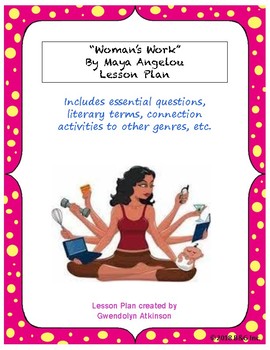Maya Angelou’s poem “Woman Work”

The clothes to mend
The floor to mop
The food to shop
Then the chicken to fry
The baby to dry
I got company to feed
The garden to weed
I’ve got shirts to press
The tots to dress
The cane to be cut
I gotta clean up this hut
Then see about the sick
And the cotton to pick.
Shine on me, sunshine
Rain on me, rain
Fall softly, dewdrops
And cool my brow again.
Storm, blow me from here
With your fiercest wind
Let me float across the sky
‘Til I can rest again.
Fall gently, snowflakes
Cover me with white
Cold icy kisses and
Let me rest tonight.
Sun, rain, curving sky
Mountain, oceans, leaf and stone
Star shine, moon glow
You’re all that I can call my own.
Maya Angelou’s poem “Woman Work:
In Maya Angelou’s poem “Woman Work”, the speaker reflects on the burdens of labor and the daily struggles of a woman, primarily through the lens of a Black woman. The poem portrays how women, particularly of color in this society. The men are often forced to carry out physical, emotional, and mental labor without the recognition or rest they deserve.
The repeated line the author wants to express that the women are
“I’ve got the children to tend / The clothes to mend / The floor to scrub” reveals the overwhelming and unending demands placed on women, reinforcing the theme of inequality in the division of labor.
Maya Angelou’s poem “Woman Work poem highlights how women are often marginalized, their work unacknowledged. Their exhaustion overlooked.
The speaker’s yearning for rest and escape—”I got the babies to feed” and “I got the hot bread to bake”—underscores the lack of freedom and opportunity that many women face, as they are burdened with duties that go unrecognized by society.
Angelou’s work thus serves as a powerful commentary on gender inequality and the systemic underappreciation of women’s labor, particularly for Black women may face the added weight of racial and economic oppression.

